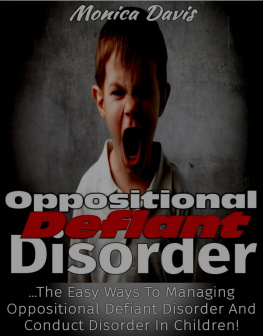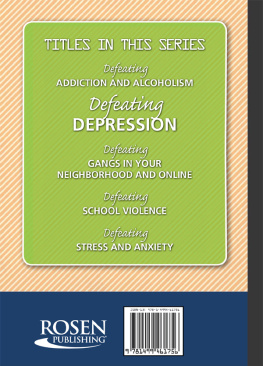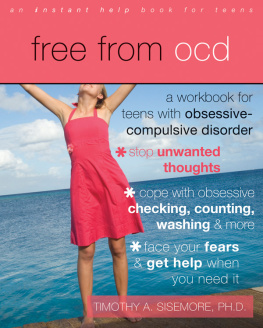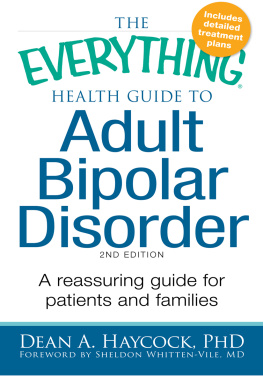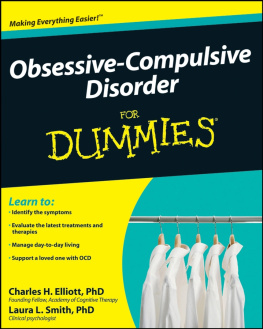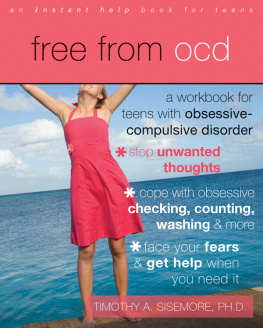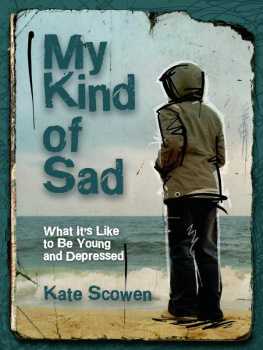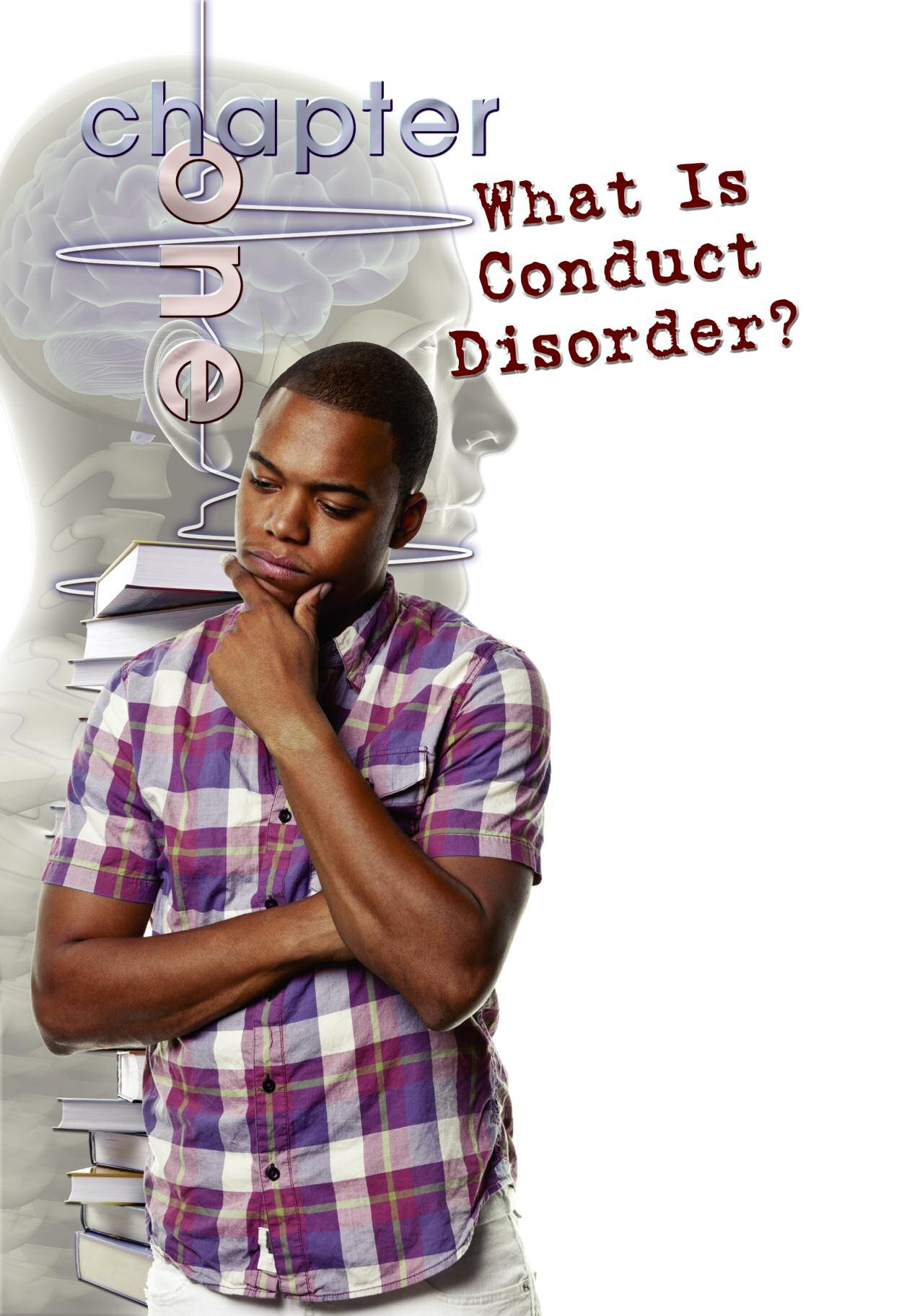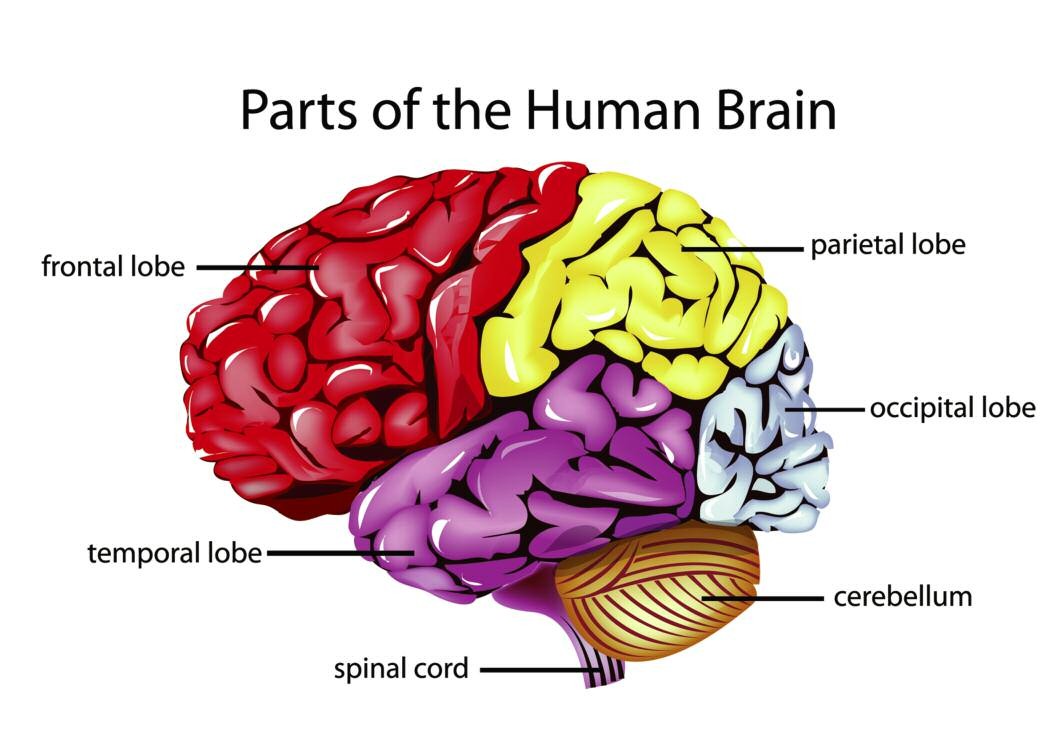This book is dedicated to caregivers of individuals with mental disorders, with gratitude to their support systems
Published in 2014 by The Rosen Publishing Group, Inc.
29 East 21st Street, New York, NY 10010
Copyright 2014 by The Rosen Publishing Group, Inc.
First Edition
All rights reserved. No part of this book may be reproduced in any form without permission in writing from the publisher, except by a reviewer.
Library of Congress Cataloging-in-Publication Data
Hollander, Barbara Gottfried. Conduct disorder/Barbara Gottfried Hollander. pages cm.(Teen mental health) Includes bibliographical references and index. ISBN 978-1-4777-1752-3 (library binding) 1. Conduct disorders in adolescence. 2. Juvenile delinquency. I. Title. RJ506.C65H65 2014
618.9285'81dc23
2013021770
Manufactured in the United States of America
CPSIA Compliance Information: Batch #W14YA: For further information, contact Rosen Publishing, New York, New York, at 1-800-237-9932.
A fourteen-year-old boy with conduct disorder may steal several times in one week. He can repeatedly lie to his parents about his actions, skip school, and torture the neighbors dog. When confronted with the seriousness of his actions, the teen shows little to no remorse. He does not appear sad, upset, or apologetic for causing physical harm. This teen may even set his house on fire. Again, no remorse is shown for these actions.

Teens who have conduct disorder usually exhibit aggressive behavior, such as intimidating and bullying others.
Threatening people, harming animals, and destroying property over and over again are often signs of a mental condition called conduct disorder (CD).
According to the Encyclopedia of Mental Disorders, this mental condition affects 9 percent of male and 2 percent of female children and teens. It is frequently visible by the age of ten. Children with conduct disorder violate the basic rights of others. They carry out their destructive and disruptive behaviors at school, home, or in other settings. This troublesome behavior makes it difficult for them to form and maintain relationships with friends and family.
When a teen has an ear infection, the doctor prescribes antibiotics. The medicine treats the bacterial infection and helps the patient heal. But what about a mental illness like CD? Is there a medicine that will heal this condition? No. Mental illnesses, or serious emotional and behavioral problems, are very difficult to treat. Doctors, such as psychiatrists and neurologists, examine possible causes to determine the most appropriate treatment plans. So what causes teens to behave in destructive and cruel ways?
Is the Body Responsible?
There are several physical factors that could cause or increase the likelihood of conduct disorder. Like some other mental, emotional, and behavioral disorders, CD is more common in boys than girls. This aspect would suggest a possible genetic (or inherited) cause.
Disorders more prevalent in boys than girls include:
Conduct disorder (CD)
Oppositional deviant disorder (ODD)
Attention-deficit/hyperactivity disorder (ADHD)
Pervasive developmental disorder (autism)
Tourettes syndrome (which includes vocal or other physical tics)
Doctors have also examined neurological, or brain-related, causes and effects. The frontal lobe of your brain (also called the cerebral cortex) is located at the top of your head and behind your forehead. It is responsible for decision making and emotions, such as empathy (or being able to relate to someone elses feelings). This part of the brain also allows you to learn from negative consequences and stay out of harms way, like not directly touching a hot pan twice. The connection between the frontal lobe and conduct disorder also suggests that children born with brain damage to the frontal lobe may be more likely to exhibit symptoms of this disorder. Damage to the frontal lobe impairs (harms or weakens) the neurological tools needed to behave appropriately.
Parts of the Human Brain
A link between conduct disorder and the impairment of the brains frontal lobe may exist.
How might this impairment present itself in the behavior of teens? Conduct disorder affects a teens ability to feel regret for his or her actions, like torturing an animal or setting a fire. A teen who has conduct disorder has difficulty relating to the feelings of an abused animal or a person with hurt feelings. Even the yelps of the dog or a persons tears might not cause a person with CD to feel empathy. This lack of empathy can also cause these teens to repeatedly hurt others and destroy property because they do not fully understand the repercussions of their actions or feel bad about them. Conduct disorder is marked by repeated and consistent destructive behavior.
Do Surroundings Count?
Children often model their parents behaviors. Suppose that a teens father is both verbally abusive (making insults and threats) and physically abusive (hitting). In this setting, the teen is more likely to become a verbal and physical abuser himself. Children who grow up with domestic violence frequently imitate the behavior of their abusive parents. Just as a parent hurts the teen, the teen hurts others. Aggressive and abusive parenting, especially by fathers, can increase the likelihood of developing CD.
If a child grows up with a parent who suffers from a mental disorder, such as antisocial personality disorder, he or she is also more likely to exhibit conduct disorder. Antisocial personality disorder involves a history of manipulating, taking advantage of, and violating others rights. For example, suppose that a teen witnesses his father consistently manipulating his mother. The dad uses the mom to get things for himself, such as material goods or more control of the family.
Now suppose that this dad makes the following conditional statement to his wife: I will not get angry if you stop seeing your friends. The mom is being asked to give up her friendships in return for her husband no longer getting angry. The dad is also trying to gain greater control over his family by isolating his wife. Two things can happen next: (1) The mom does not give up her friends and the next time that dad explodes, he blames her; or (2) she gives up her friends. The next time dad explodes, he finds another reason to blame mom (or one of the children). Either way, the dad explodes and blames someone else for his behavior.
Now consider the effect on the teen who has CD. He views his dads manipulative behavior as effective. Dad often gets what he wants within the home environment. So the teen uses manipulation to get what he wants, too. The teen also rationalizes his physical aggression by blaming others. For example, the teen hits his mother and blames her for these actions. By imitating his fathers behavior, the teen exhibits symptoms of conduct disorder consistent with violating the rights of others.






